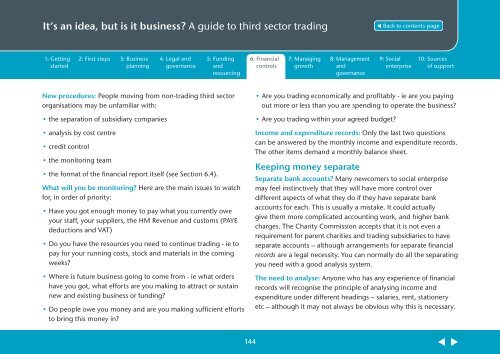A guide to third sector trading - WCVA
A guide to third sector trading - WCVA
A guide to third sector trading - WCVA
Create successful ePaper yourself
Turn your PDF publications into a flip-book with our unique Google optimized e-Paper software.
It’s an idea, but is it business? A <strong>guide</strong> <strong>to</strong> <strong>third</strong> sec<strong>to</strong>r <strong>trading</strong><br />
1: Getting<br />
started<br />
2: First steps 3: Business<br />
planning<br />
4: Legal and<br />
governance<br />
5: Funding<br />
and<br />
resourcing<br />
6: Financial<br />
controls<br />
7: Managing<br />
growth<br />
8: Management<br />
and<br />
governance<br />
9: Social<br />
enterprise<br />
10: Sources<br />
of support<br />
New procedures: People moving from non-<strong>trading</strong> <strong>third</strong> sec<strong>to</strong>r<br />
organisations may be unfamiliar with:<br />
• the separation of subsidiary companies<br />
• analysis by cost centre<br />
• credit control<br />
• the moni<strong>to</strong>ring team<br />
• the format of the financial report itself (see Section 6.4).<br />
What will you be moni<strong>to</strong>ring? Here are the main issues <strong>to</strong> watch<br />
for, in order of priority:<br />
• Have you got enough money <strong>to</strong> pay what you currently owe<br />
your staff, your suppliers, the HM Revenue and cus<strong>to</strong>ms (PAYE<br />
deductions and VAT)<br />
• Do you have the resources you need <strong>to</strong> continue <strong>trading</strong> - ie <strong>to</strong><br />
pay for your running costs, s<strong>to</strong>ck and materials in the coming<br />
weeks?<br />
• Where is future business going <strong>to</strong> come from - ie what orders<br />
have you got, what efforts are you making <strong>to</strong> attract or sustain<br />
new and existing business or funding?<br />
• Do people owe you money and are you making sufficient efforts<br />
<strong>to</strong> bring this money in?<br />
• Are you <strong>trading</strong> economically and profitably - ie are you paying<br />
out more or less than you are spending <strong>to</strong> operate the business?<br />
• Are you <strong>trading</strong> within your agreed budget?<br />
Income and expenditure records: Only the last two questions<br />
can be answered by the monthly income and expenditure records.<br />
The other items demand a monthly balance sheet.<br />
Keeping money separate<br />
Separate bank accounts? Many newcomers <strong>to</strong> social enterprise<br />
may feel instinctively that they will have more control over<br />
different aspects of what they do if they have separate bank<br />
accounts for each. This is usually a mistake. It could actually<br />
give them more complicated accounting work, and higher bank<br />
charges. The Charity Commission accepts that it is not even a<br />
requirement for parent charities and <strong>trading</strong> subsidiaries <strong>to</strong> have<br />
separate accounts – although arrangements for separate financial<br />
records are a legal necessity. You can normally do all the separating<br />
you need with a good analysis system.<br />
The need <strong>to</strong> analyse: Anyone who has any experience of financial<br />
records will recognise the principle of analysing income and<br />
expenditure under different headings – salaries, rent, stationery<br />
etc – although it may not always be obvious why this is necessary.<br />
144












